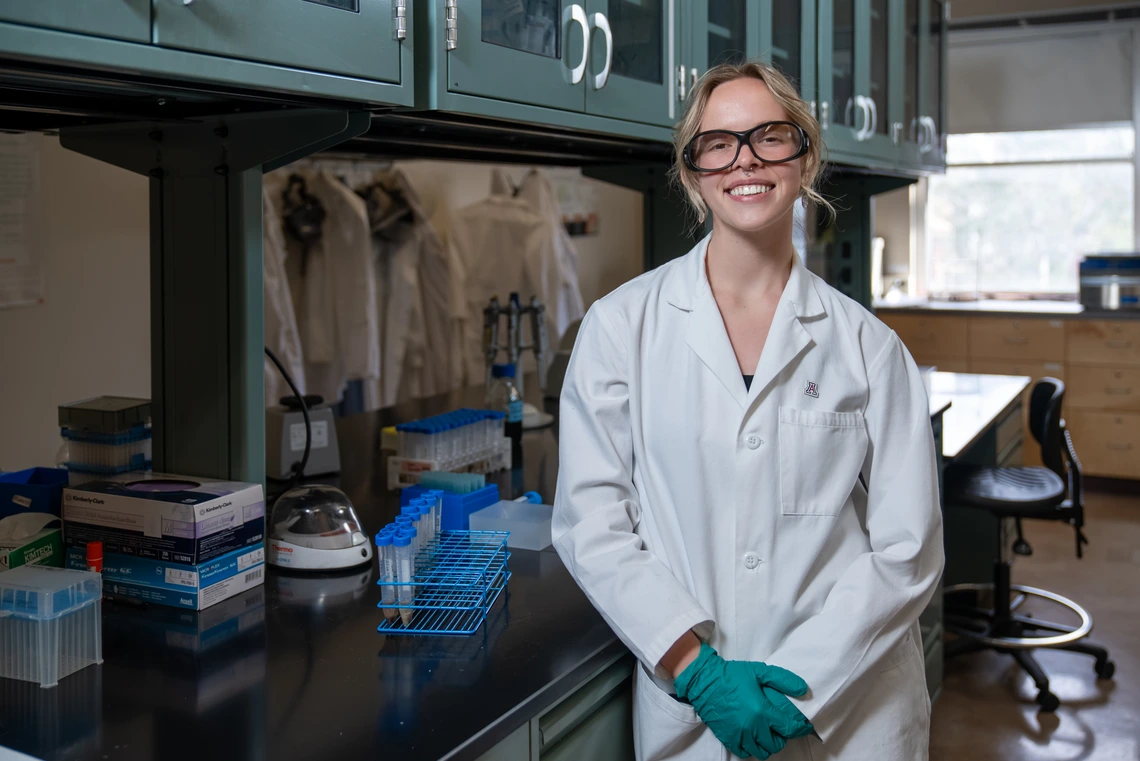Studying Oxytocin and Childhood Adversity Leads to Outstanding Research Award: Paige Wagstaff, ‘25

Paige Wagstaff, who is graduating with a major in anthropology with a human biology emphasis and a minor in nutritional sciences, is the recipient of the SBS Outstanding Undergraduate Research Award for spring 2025. The award recognizes a graduating senior in the College of Social and Behavioral Sciences who has demonstrated academic achievement, originality and creativity in an independent undergraduate research project.
“Paige is thoughtful, skilled in the lab, professional in every setting, and an award-winning presenter. Most importantly, she is deeply committed to research that is both innovative and community-focused,” said Stacey Tecot, a professor in the School of Anthropology, director of the Laboratory for the Evolutionary Endocrinology of Primates, or LEEP.
Paige completed her senior thesis on the relationship between maternal pre- and postpartum oxytocin levels and significant childhood adversity in humans. Her findings — new mothers with greater early-life adversity had higher postpartum oxytocin levels and a larger increase in oxytocin from pre- to postpartum — were a surprising and novel result.
“This nuanced view of oxytocin regulation raises critical questions about the adaptability of the oxytocin system and how interventions might support at-risk mothers and infants,” wrote Tecot.
Paige has spent the past two years developing her senior thesis—an original project shaped by her internship in LEEP. During that time, she joined the U of A College of SBS and College of Medicine on an NIH-funded study on hormonal responses to infant caregiving in people with opioid use disorder.
Paige learned lab and hormone assay techniques, met with collaborators across institutions, and conducted a literature review to identify knowledge gaps. She proposed a unique research question outside the original scope of the grant, which was approved by all co-investigators.
Thanks to her professionalism, strong research skills, and ability to explain her work clearly across audiences, Paige has earned some standout opportunities. She was entrusted to analyze hormone levels in over 100 irreplaceable samples, took part in interviews for “Research Matters” on KXCI radio and the PeerJ blog, and led a DNA extraction training workshop after first learning the technique herself. Her dedication hasn’t gone unnoticed either — Paige won Best Undergraduate Poster at the Southwestern Association of Biological Anthropologists and earned the Outstanding Student Presentation award at the 2025 American Association of Biological Anthropologists.
Paige’s gratitude runs deep — for the people, programs, and departments that supported her every step of the way; the LEEP team for feedback on her writing, bolstered her through tough lab days, and offered their “thoughtful reassurance”; Alicia Allen, Linnea Linde-Krieger, and Lela Rankin Williams, who played a significant role in helping her complete her senior thesis by giving feedback and letting her work with their data; and the College of Social and Behavioral Sciences and the School of Anthropology, which provided “invaluable opportunities to grow intellectually, collaborate with exceptional researchers, explore compelling questions, and pursue meaningful answers.”
“It is a profound honor to receive this award, and I am deeply grateful,” Paige said. “This achievement would not have been possible without the support and contributions of many talented individuals. I truly would not be here without Dr. Stacey Tecot, who provided constant encouragement, pushed me to think critically, and provided endless opportunities to achieve my research goals.”
What’s next? Paige will travel to Madagascar with LEEP as a research assistant, where she will attend the International Primatological Society Conference and co-present a poster. After returning, she wants to work in a lab or zoo setting while she applies to graduate programs.
##

